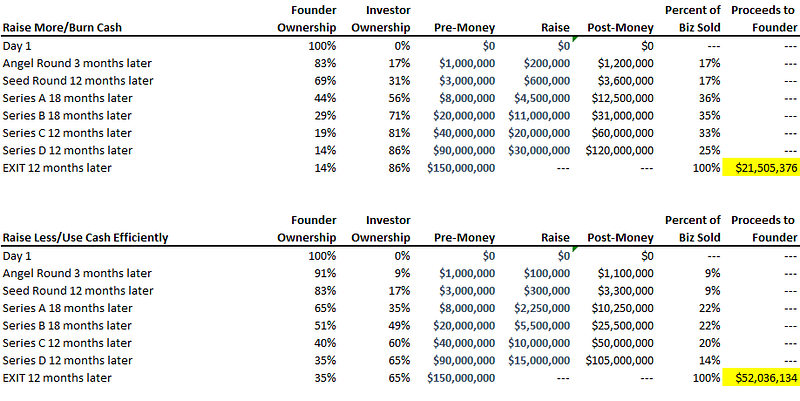Cash efficiency compounds your ownership
There’s a compelling reason to keep burn down and be cash efficient: it limits founder dilution. The less money you raise, the less dilution founders absorb, but what many founders don’t realize is that the relationship is not linear. In other words, being cash efficient has a compounding effect on limiting founder dilution: in a simple analysis we did, raising 50% as much money and being cash efficient resulted in 142% more ownership for founders at exit (not just 100% which is what a linear relationship would imply). The math follows.
Below we show a company going from angel round to exit in 7.25 years. The final column which is proceeds to the founder shows what the ownership stake is worth after all the growth and offsetting dilution. In this table, our founder raises $66.3mm and exits the business are a valuation of $150mm. The dilution over time results in an ownership stake of 14% to the founder worth $21.5mm.

Not bad, but in the next table, we show what it looks like if the founder was cash efficient and raised half as much capital. Given the compounding effect of capital efficiency on dilution, in this example the founder raises 50% less cash ($33.1mm), but instead of owning twice as much equity (28%), the founder owns 35% of the business thanks to the compounding effect of cash efficiency. The value of the founder’s stake at exit is therefore $52mm or 142% more than our original example.
In summary, cash efficiency and keeping burn down isn’t just good for investors, it’s good for founders as the compounding effect of cash efficiency results in significantly lower founder dilution.
Visit us at blossomstreetventures.com and email us directly with Series A or B opportunities at . Connect on LI as well. We invest $1mm to $1.5mm in growth rounds, inside rounds, small rounds, cap table restructurings, note clean outs, and other ‘special situations’ all over the US & Canada.